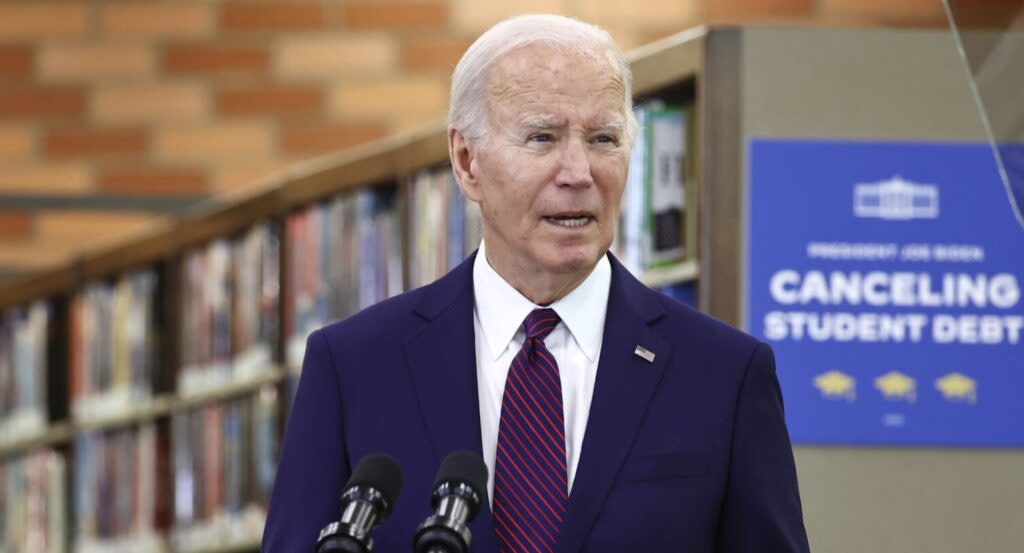Biden’s push to cap rent hikes could energize the pursuit in Washington

President Joe Biden on Tuesday called for a limit on rent increases. Washington state lawmakers have debated rent cap legislation the past two years but no bill has made it to the governor's desk. (Photo by Mario Tama/Getty Images)
Democratic state lawmakers in Washington came up empty this year when they sought to cap rent increases to help tenants cope with surging costs of housing.
They view President Joe Biden’s call Tuesday for limiting rent hikes as validation that housing affordability is a problem nationwide, and say it could re-energize the conversation on assisting renters in Washington.
“It does support what we’ve been seeing and hearing that rent increases are hurting working people,” said Sen. Yasmin Trudeau, D-Tacoma, sponsor of a rent stabilization measure in the 2024 session. “I’m glad there’s a push at the federal level to recognize that.”
“Across the board, whether you’re Republican or Democrat, rural or urban, affordability is top of mind,” she continued. “It’s definitely a bipartisan problem. We’ll see if his introducing this plan will sway any of my colleagues.”
Under Biden’s proposal, landlords could raise rents no more than 5% a year if they want to claim a federal tax break enabling faster write-off of depreciation costs.
His proposal would only apply to owners of 50 or more units and includes exceptions for new construction and substantial renovation or rehabilitation. The Biden administration estimates this could cover more than 20 million units nationwide. If enacted, it would sunset in two years.
“Rent is too high and buying a home is out of reach for too many working families and young Americans, after decades of failure to build enough homes. I’m determined to turn that around,” Biden said in a statement. “I’m sending a clear message to corporate landlords: If you raise rents more than 5% on existing units, you should lose valuable tax breaks.”
Representatives of two statewide associations of rental property owners blistered the president’s plan, saying it would neither lower housing costs nor increase its supply. Accelerated depreciation is an incentive to spur investment and taking it away will result in less new construction.
“We all absolutely, unequivocally agree that rent caps are not a solution to the housing crisis we’re experiencing,” said Nick Marin, executive director of the Washington Multi-Family Housing Association, whose members would be affected by the federal plan. Collectively, the members represent 340,000 units and most have properties of 50 units or more.
Ryan Makinster, director of government affairs for the association, said in Washington “we need 1 million units in the next 20 years. [Biden’s] plan will chill or stop development when we need new supply.”
Washington lawmakers’ lamented Biden’s plan is short-term and only covers a segment of the rental market rather than all of it. They also said they aren’t waiting on Congress to act.
Rep. Strom Peterson, D-Edmonds, chair of the House Housing Committee, said it should apply universally as big landlords could find a workaround to avoid being subject to the cap.
“I appreciate the conversation is happening at a national level but we know we need to act locally,” he said.
A reset in 2025
Democrats’ pursuit of a bill to limit hikes to 7% a year for many tenants made for one of the fiercer policy fights in this year’s legislative session.
It passed the state House on a mostly party-line vote as Republicans staunchly opposed the idea of limiting increases. But the legislation lapsed in a Senate committee as divisions emerged in the Democratic caucus, specifically when it comes to how far moderate members were willing to go in setting government guardrails around rent prices.
Trudeau and Peterson each vowed to restart the conversation in January.
“I believe what we passed out of the House last session was a good, reasonable piece of legislation,” Peterson said.
Sean Flynn, president and executive director of the Rental Housing Association of Washington, said the group opposed the legislation this past session and will do so in the next if it comes up.
“Rent control is a failed policy. It’s never worked anywhere where it’s been tried,” he said. Biden’s proposal “probably adds heat to the conversation. What I’m hoping is that we have cooler heads prevail than adopting a failed policy from the last century.”
And it may not be the only legislation to be debated.
Biden’s approach mirrors a bill authored by Sen. Patty Kuderer, D-Bellevue, which failed to receive a vote by the full Senate last session.
In Washington, rental property owners do not pay a business and occupation tax on rent they collect. Kuderer’s bill sought to change the law and start to levy a tax.
It also would have given the tax exemption to landlords who voluntarily agreed to limit annual increases to no more than 5%. There should be a public purpose associated with a tax break, and, in this situation, it would be helping keep people in their homes, she said.
“It is an incentive-based approach,” she said. “Do we want them living in the streets or have a roof over their head? I prefer the latter.”
The post Biden’s push to cap rent hikes could energize the pursuit in Washington appeared first on Washington State Standard.

